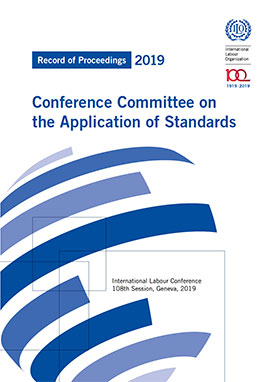The CAS, an essential component of the ILO supervisory system, examines each year the report of the CEACR. Following the technical and independent scrutiny of government reports and other information carried out by the CEACR, the CAS provides the opportunity for the representatives of governments, employers and workers to examine jointly the manner in which member States fulfil their obligations deriving from ILS.
Mandate
The CAS is a standing tripartite body of the International Labour Conference established in 1926. It is composed of hundreds of members among Government, Employer and Workers members and deputy members. Questions related to the composition of the CAS, the right to participate in its work and the voting procedure are regulated by Part 4 of the Standing Orders of the International Labour Conference.
Each year, the CAS elects its Officers: a government Chairperson, two Vice-Chairpersons – one from the employers’ group and one from the workers’ group, and a government Reporter.
Pursuant to article 10, paragraph 1, of the Standing Orders of the International Labour Conference, the CAS has to consider:
- compliance by Members with their obligations to communicate information and reports under articles 19, 22, 23 and 35 of the ILO Constitution;
- individual cases relating to the measures taken by Members to give effect to the Conventions to which they are parties;
- the law and practice of Members with regard to selected Conventions to which they are not parties and Recommendations, as chosen by the Governing Body (general survey).
As required by article 10, paragraph 4, of the Standing Orders of the International Labour Conference, the CAS submits a report to the International Labour Conference.
In accordance with the established practice, the CAS:
- discusses the general aspects of the application of ILS and the discharge by member States of standards-related obligations under the ILO Constitution, primarily based on the General Report of the CEACR;
- discusses the General Survey prepared by the CEACR;
- examines cases of serious failure to fulfil reporting and other stands-related obligations; and
- examines 24 individual cases relating to the application of ratified Conventions.
The individual cases are selected on the basis of the observations published in the CEACR report submitted to the International Labour Conference.
A preliminary list of around 40 individual cases for possible discussion (also known as “longlist”) is made available at least 30 days before the opening of the International Labour Conference. This practice responds to a request from governments for early notification, so that they may better prepare themselves for a possible intervention before the CAS. Following changes introduced in 2019, governments on the preliminary list of individual cases are given the opportunity to submit new written information on a voluntary basis. This information should concern only new developments not yet examined by the CEACR. They must be transmitted in one of the three working languages of the Office at least two weeks before the beginning of the opening of the session of the International Labour Conference and shall not exceed three pages.
The final list of individual cases is submitted to the CAS, after the Employers’ and Workers’ groups have met to discuss and finalize it. The list is adopted at the beginning of the CAS work, ideally no later than its second sitting. Since 2007, it has been the practice to follow the adoption of the list of individual cases with an informal information session for governments, hosted by the Employer and Worker Vice-Chairpersons, to explain the criteria used for the selection of individual cases.
The conclusions regarding individual cases are proposed by the Vice-Chairpersons and submitted by the Chairperson to the CAS for adoption. The conclusions are made visible on a screen and at the same time a hard copy of these conclusions is provided to the government representative concerned in one of the three working languages, chosen by the government. The government representatives may take the floor after the Chairperson has announced the adoption of the conclusions.
To know more about the criteria for the selection of individual cases, see document “C.App./D.1: Work of the Committee”, which is available in the ILO website, in the pages dedicated to the International Labour Conference, and is appended to the CAS reports.
The CAS report is submitted for discussion by the International Labour Conference in plenary and adopted. It is then published on the ILO website in the Record of proceedings. A separate publication in a more attractive format brings together the usual three parts of the work of the CAS. The publication is structured in the following way:
- the General Report of the CAS;
- the report of the CAS on the observations and information concerning particular countries, which also reproduces the observations of the CEACR concerning the individual cases, in order to facilitate the reading of the CAS discussion on them; and
- the report of the CAS: submission, discussion and approval.
Following changes introduced in June 2019, the report of the CAS is published as a verbatim record and no longer summarizes the discussion.
To know more about the CAS, see the dedicated page on the ILO website, and a detailed presentation about its work.


